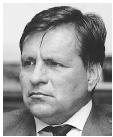MACEDONIA
Boris Trajkovski
President

(pronounced "BAH-riss try-KOFF-ski")
"I believe that we will succeed in making Macedonia a stable and prosperous democratic country with a high level of respect for human rights and freedoms and a high standard of living for all citizens."
The Former Yugoslave Republic of Macedonia spans 25,713 sq km (9,928 sq mi) and is surrounded by Serbia and Montenegro to the north, Albania to the west, Bulgaria to the east, and Greece to the south. The capital is Skopje, (pronounced "SKOPE-jeh") situated on the Vardar River. The population is estimated at 2.05 million, and breaks down as 64.6% Macedonian, 21% Albanian, 4.8% Turkish, 2.7% Roma (Gypsies), 2.2% Serbs, and about 4% others. The Macedonian Orthodox religion, likened to Eastern Orthodox teachings, is practiced by the vast majority of Macedonians. Situated at a strategic crossroads in the Balkan Peninsula, geographic Macedonia has been subject to conquest and territorial disputes for centuries. In the fourth century BC, Alexander the Great established control over the territory of Greece and Macedonia. Macedonia was invaded by Slavic tribes in the sixth and seventh centuries AD. The Ottoman Turks conquered Macedonia in the fourteenth century and remained in control of the territory for over five centuries. Macedonia was wrested from Turkey in the Balkan Wars of 1913 and was divided among Serbia, Greece, and Bulgaria. After World War I, Macedonia was again partitioned. The Yugoslav part of Macedonia became incorporated into Serbia. After World War II, Macedonia was reconstituted by Marshal Tito as a constituent Yugoslav state, one of six equal federal republics. Tito permitted and promoted the development of a Macedonian culture, language, and nationality within Yugoslavia but distinct from either Serbia or Bulgaria.
Within Yugoslavia, the Republic of Macedonia was the poorest of the six Yugoslav republics, and contributed only about 6% of overall gross national product (GNP). Its main industries are agriculture, textiles, and minerals, which were mainly geared for markets in the other Yugoslav republics. A new Macedonian currency, the denar , was launched at the end of 1992.
ADDRESS
Office of the President
Republic of Macedonia
Dame Gruev bb
1000 Skopje Macedonia
Comment about this article, ask questions, or add new information about this topic: